Pope Francis

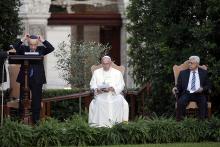
The Vatican’s decision to recognize Palestine as a sovereign state on May 13 angered Israeli officials.
The move comes four days before the first-ever canonization of two Palestinian nuns and it solidifies the standing of Palestinian President Mahmoud Abbas, who is scheduled to meet with Pope Francis at the Vatican on Saturday.
Israeli Foreign Ministry spokesman Emmanuel Nahshon told The Times of Israel that the government is “disappointed by the decision. We believe that such a decision is not conducive to bringing the Palestinians back to the negotiating table.”
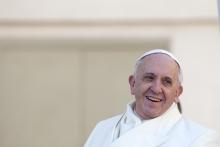
The Vatican announced it will recognize the state of Palestine in a treaty concluded May 13.
The treaty is awaiting formal approval and signing, but it is already being recognized as a major statement of support for a Palestian state in the historically contested region.
The pope has long signaled his support of a state. The language of the treaty, while not yet signed, has alarmed Israelis but invigorated the Palestinian case for statehood, The New York Times reports.
For the past year, the Vatican had informally referred to the country as “state of Palestine,” in its yearbook as well as in its program for Francis’ 2014 visit to the Holy Land.
Formal recognition of a Palestinian state by the Vatican, which has deep religious interests in the Israeli-occupied Palestinian territories that include Christian holy sites, lends a powerful signal of legitimacy to the efforts by the Palestinian Authority’s president, Mahmoud Abbas, to achieve statehood despite the long paralyzed Israeli-Palestinian peace process.
Read more from The New York Times here.
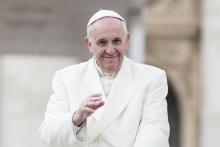
The Rev. Martin Schlag is a trained economist as well as a Catholic moral theologian, and when he first read some of Pope Francis’ powerful critiques of the current free market system he had the same thought a lot of Americans did: “Just horrible.”
But at a meeting on May 11 at the Harvard Club, Schlag, an Austrian-born priest who teaches economics at an Opus Dei-run university in Rome, reassured a group of Catholics, many from the world of business and finance, that Francis’ views on capitalism aren’t actually as bad as he feared.

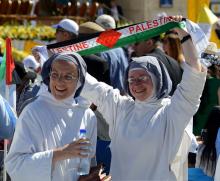
Pope Francis will bestow sainthood on two Palestinian nuns on May 17, a move that’s being seen as giving hope to the conflict-wracked Middle East and shining the spotlight on the plight of Christians in the region.
Sisters Maria Baouardy and Mary Alphonsine Danil Ghattas are due to be canonized by the pontiff along with two other 19th-century nuns, Sister Jeanne Emilie de Villeneuve, from France, and Italian Sister Maria Cristina dell’Immacolata.
The coming canonizations have been described by the Latin patriarch of Jerusalem, Fouad Twal, as a “sign of hope” for the region.
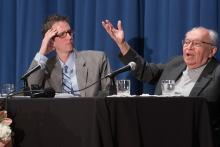
Reagan and John Paul helped spell doom for the Soviet empire, and the pontiff waged a decades-long campaign inside the church — helped by his doctrinal chief, Cardinal Joseph Ratzinger, who would later become Pope Benedict XVI — to quash liberation theology and silence its most ardent supporters.
Today, however, it’s a wholly different story — and to listen to the Rev. Gustavo Gutierrez, the Dominican priest from Peru who is known as the father of liberation theology, one might wonder what all the fuss was about.
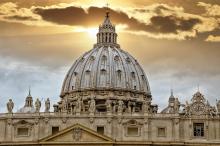
The Vatican’s semiofficial newspaper blasted a series of cartoons of Islam’s Prophet Muhammad as “blasphemous” but also condemned the “mad and bloodthirsty” extremists who opened fire at a Texas exhibit of the cartoons.
The front page article in L’Osservatore Romano likened the exhibit in Garland, Texas, to pouring “gasoline on the fire” of religious sensitivities and was critical of its sponsors, the American Freedom Defense Initiative, and professional provocateur Pamela Geller.
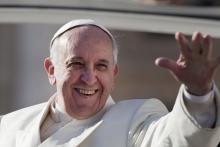
The papal address to the Republican-controlled Congress is likely to be one of the most closely watched talks during the pope’s weeklong visit to Washington, New York, and Philadelphia this fall, especially since the presidential campaign season will be growing more intense.
Francis isn’t shy about tackling controversial topics or upending conventional orthodoxies about Catholics and politics — a prospect that makes U.S. conservatives especially nervous, given Francis’ insistence on raising concerns about issues such as economic justice, climate change, and immigration.
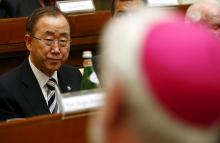
Top officials from the Vatican, the head of the United Nations, and leading scientists came together at a summit April 28 in Vatican City to label the fight against man-made climate change as a “moral issue.”
“Mitigating climate change and adapting to its effects are necessary to eradicate extreme poverty, reduce inequality, and secure equitable, sustainable economic development,” said Ban Ki Moon, U.N. secretary-general, in the keynote speech.
“It is a moral issue. It is an issue of social justice, human rights, and fundamental ethics,” the secretary-general said, adding that “climate change is the defining issue of our time.”
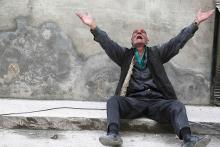
Just a few decades ago, Aleppo was home to about 170,000 Catholics, about a third of the city’s population. Since the war broke out, Jeanbart has seen a third of his flock reduced by death, dislocation, and emigration while Aleppo’s Muslim population has soared.
The threat of annihilation is constant, as Aleppo has become the main battleground between the government forces of President Bashar Assad and a motley assortment of rebels who include growing numbers of fighters affiliated with the fundamentalist terrorism of the Islamic State group.
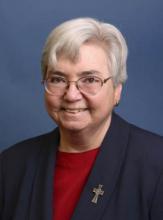
Sister Mary Ann Walsh, a quiet nun with a keen wit who led a very public life as a journalist and a longtime spokeswoman for the U.S. Conference of Catholic Bishops, died on April 28 after a tough battle with cancer.
She was 67 and passed away in a hospice in Albany next to the regional convent of the religious order she entered as a 17-year-old novice in 1964.
Walsh had moved to her native Albany from Washington last September after it was discovered that the cancer that had been in remission since 2010 had returned.
She was able to receive better care there and live out her days with other members of the Sisters of Mercy. She was transferred to the hospice on April 23 as her condition deteriorated.
“Sister Mary Ann,” as she was known to the many journalists she sparred and joked with and, with regularity, befriended, worked at the communications office of the American hierarchy for 20 years, retiring in the summer of 2014 just before she fell ill again.
She became director of media relations for the USCCB — the first woman to hold that position — after coordinating media for World Youth Day in Denver in 1993, which featured an enormously successful visit by then-Pope John Paul II.
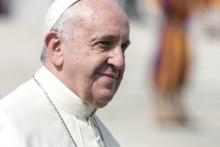
Pope Francis has been hailed for his forward thinking, but — at least according to French news reports — the pontiff has put on the brakes when it comes to a gay French ambassador at the Vatican.
In January, French President Francois Hollande nominated his protocol chief Laurent Stefanini as Vatican envoy to replace outgoing ambassador Bruno Joubert. The pick seemed ideal: 55-year-old Stefanini is described as brilliant and a devout Roman Catholic, who secured support for his candidacy from Cardinal Andre Vingt-Trois, the archbishop of Paris. He is also a known quantity at the Vatican, having served as first councillor to the Holy See a decade ago.
But so far, his nomination has gone nowhere. On April 22, France’s investigative weekly “Le Canard Enchaine” reported Pope Francis met with Stefanini last weekend. The message: The pontiff did not appreciate France’s 2013 same-sex marriage law, nor being pressured into accepting Stefanini’s candidacy.
French media report the standoff is due to Stefanini’s sexual orientation; France’s foreign ministry has only said his private life should be respected.
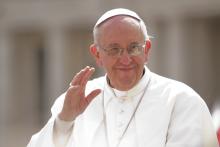
Pope Francis will visit Cuba before arriving in the United States in September, the Vatican said April 22.
Rev. Federico Lombardi, Vatican spokesman, confirmed the news to reporters in a statement made in Italian, Spanish, and English.
“I am able to confirm that the Holy Father Francis, having received and accepted the invitation from the civil authorities and bishops of Cuba, has decided to pay a visit to the island before his arrival in the United States for the trip announced some time ago,” Lombardi said.
The pope is scheduled to visit Washington, New York City, and Philadelphia starting around Sept. 23.
Francis would be the third pope to visit Cuba, after St. John Paul II in 1998 and Pope Emeritus Benedict XVI in 2012.
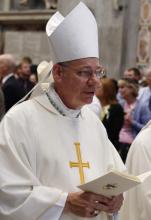
When Pope Francis accepted the resignation of Missouri Bishop Robert Finn, who was convicted three years ago for failing to report a priest suspected of child abuse, he sent a powerful message to the Catholic Church.
Here are five takeaways from the news, which the Vatican announced on April 21.
1. This is a big deal.
During the past decade, the most intense years of the Catholic Church’s long-running clergy sex abuse scandal, thousands of priests have been punished or defrocked for abusing children, and a few bishops found guilty of molestation have also quit.
But until Finn, no American bishop had ever been forced from office (despite the terse Vatican announcement that he “resigned”) for covering up for a predator priest.
That sets a precedent in an institution where many have regarded the hierarchy as a privileged caste that should not be held to the same standards as others in the church. Some feared that if a bishop were pushed out for failing to do his job, it would create a domino effect that could topple the entire superstructure.
“We all know there are other U.S. bishops wondering ‘who is the next?’” tweeted church historian Massimo Faggioli.
But Francis seems to be betting this sort of accountability at the top will strengthen the church, and even help restore the credibility of the bishops.
2. Finn was an easy case.
Finn is the only U.S. bishop ever convicted in court of failing to report a suspected abuser, the Rev. Shawn Ratigan, who was later sentenced to 50 years on federal child pornography charges.
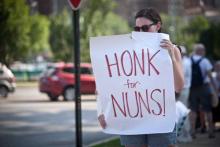
The Vatican on April 16 officially ended a controversial investigation of American nuns with a face-saving compromise that allows Pope Francis to close the book on one of the more troubled episodes from the pontificate of his predecessor, Benedict XVI.
“We are pleased at the completion of the (investigation), which involved long and challenging exchanges of our understandings of and perspectives on critical matters of religious life and its practice,” Sister Sharon Holland, president of the leadership network of nuns that had been under investigation, said in a statement released following a meeting in Rome with the Vatican’s top doctrinal officials.
“Through these exchanges, conducted always in a spirit of prayer and mutual respect, we were brought to deeper understandings of one another’s experiences, roles, responsibilities, and hopes for the church and the people it serves,” said Holland.
“We learned that what we hold in common is much greater than any of our differences.”
A brief statement from Cardinal Gerhard Mueller, head of the Congregation for the Doctrine of the Faith and leader of the effort to rein in the nuns, who were seen as too liberal, shed little light on what the long-running investigation achieved and seemed aimed at moving past the contentious saga.
Mueller said he was confident that the mission of the nuns “is rooted in the Tradition of the Church” and that they are “essential for the flourishing of religious life in the Church.” The original report had accused the nuns of promoting “certain radical feminist themes incompatible with the Catholic faith.”
In another indicator of the thaw in relations, the delegation of American nuns met later on April 16 with Francis for 50 minutes in a warm encounter that seemed to underscore the sisters’ affinity for the pope’s focus on social justice and on pastoral outreach to the world.
“Our conversation allowed us to personally thank Pope Francis for providing leadership and a vision that has captivated our hearts and emboldened us as in our own mission and service to the church,” the nuns said in a statement.
“We were also deeply heartened by Pope Francis’ expression of appreciation for the witness given by Catholic sisters through our lives and ministry and will bring that message back to our members.”
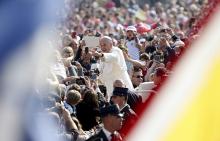
The Vatican is set to host a major conference on climate change this month that will feature leading researchers on global warming and an opening address by U.N. Secretary-General Ban Ki-moon.
The meeting, which the Vatican detailed on its website late on April 14, is another sign of Pope Francis’ “green agenda” and another potential red flag for conservatives who are already alarmed over an expected papal teaching document on the environment that is scheduled for release this summer.
The one-day summit on April 28 will also include participants from major world religions and aims to “elevate the debate on the moral dimensions of protecting the environment in advance of the papal encyclical,” as the papal document is known.
Another goal, says a statement on a Vatican website, is to highlight “the intrinsic connection between respect for the environment and respect for people — especially the poor, the excluded, victims of human trafficking and modern slavery, children, and future generations.”
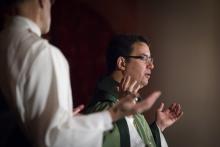
The U.S. Catholic bishops have welcomed the Obama administration’s tentative agreement aimed at limiting Iran’s nuclear ambitions, and their top spokesman on international affairs bluntly warned Congress against doing anything to undermine it.
The bishops “oppose efforts that seek to undermine the negotiation process or make a responsible multi-party agreement more difficult to achieve and implement,” Bishop Oscar Cantu, chairman of the bishops’ Committee on International Justice and Peace Committee, wrote to House and Senate lawmakers on April 13.
“The alternative to an agreement leads toward armed conflict, an outcome of profound concern to the Church,” said Cantu, who heads the Diocese of Las Cruces, N.M.
The warning — and accompanying support in a letter of commendation that Cantu sent last week to Secretary of State John Kerry — follow a thumbs-up from Pope Francis to the proposed accord, and coincides with an endorsement on April 13 by a group of largely liberal mainline Protestant leaders.
Diplomats from the U.S. and six world powers meeting in Switzerland earlier this month unveiled the framework of what could be an historic accord to inspect Iran’s growing nuclear program and prevent it from developing a nuclear weapon.

Pope Francis has repeatedly said he expects his papacy to be a brief one, but Cardinal Walter Kasper is working to ensure that the pontiff’s legacy endures long after this pope leaves the scene.
From the first days of his pontificate two years ago, Francis singled out Kasper for high praise; ever since, the retired German cardinal is frequently known as “the pope’s theologian.”
It’s a moniker the churchman shrugs off with a smile, yet it’s also a label he’s doing nothing to shake, especially in light of Kasper’s most recent book, published last month — a short work that basically describes Francis as a theologian in his own right whose pastoral approach is setting Catholicism on a new course.
The title of the book, from the U.S. Catholic publishing house Paulist Press, says it all: Pope Francis’ Revolution of Tenderness and Love.
But the title also sums up the two-pronged challenge for those, like Kasper, who hope that Francis’ papacy represents lasting change.
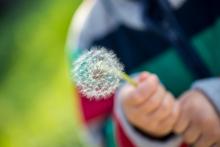
AS POPE FRANCIS prepares to release his encyclical on climate change, it’s worth remembering exactly how far the conversation on religion and the environment has come in the past quarter-century.
When I wrote The End of Nature back in the late 1980s, there was very little religious environmentalism. Liberal churches believed that ecology was a subject to be addressed once you’d finished with war and poverty; conservative churches viewed it as a way station on the road to paganism. And Christians in general still reeled under the idea, propounded by Lynn White in an influential essay in Science magazine, that the Genesis call for dominion had led directly to the destruction we saw around us.
In those early days, there were a few wayfarers on this path. Thomas Berry, for instance, and even more important a pair of academics—Mary Evelyn Tucker and John Grim—who picked up his clues and sweated blood to assemble theologians from around the world and search every tradition for the roots of ecological thinking. Episcopal Power and Light—now Interfaith Power and Light—was an early and successful effort at congregational action; Shomrei Adamah (Guardians of the Earth) was an early effort in the Jewish community that has blossomed into many flowers.
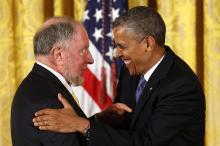
Harvard professor Robert Putnam jokingly calls himself “a nice Jewish formerly Methodist boy.”
But the public policy expert’s new book, Our Kids, reads more like a tent meeting revival, complete with an “altar call” at the end. His private meetings and public appearances at the White House and Capitol Hill, and meetings with civic and faith leaders across the country, carry the same fervor.
While evangelists convict people of their sinful ways and then convert them to the path of salvation for the hereafter, Putnam’s focus is more on this side of heaven.
His goal: to awaken and inspire Americans to “save” young people from a future trapped in a spiral of fractured families, poor schooling, and a grim economic future that Putnam says will cost taxpayers trillions of dollars. Trillions.
He is not only aiming for political, social, and religious elites. He’s also aiming at the everyday reader from Boston to Dubuque with a message that failure to act will “undermine democracy and political stability for all.” That’s why the book is subtitled, “The American Dream in Crisis.”
“I’m writing for ordinary people, not the political class. I’m holding up a mirror of American society to the ‘haves’ to say ‘look what we’ve become,’” he said.